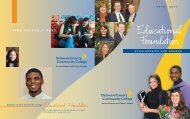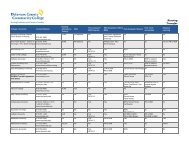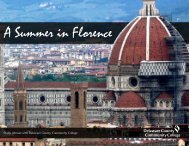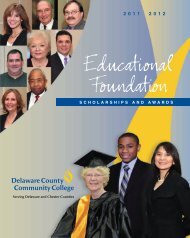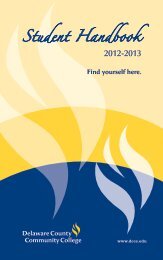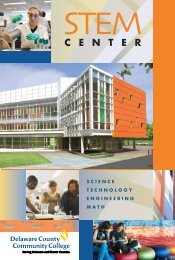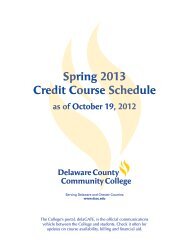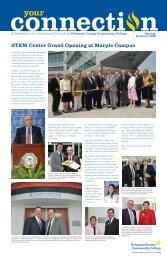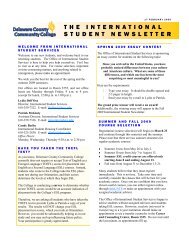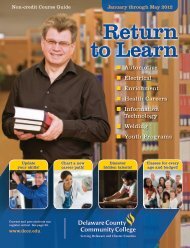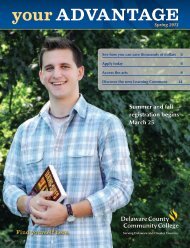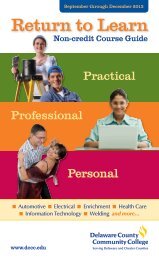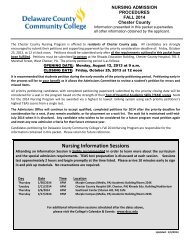2010 Catalog - Delaware County Community College
2010 Catalog - Delaware County Community College
2010 Catalog - Delaware County Community College
Create successful ePaper yourself
Turn your PDF publications into a flip-book with our unique Google optimized e-Paper software.
112 COURSE DESCRIPTIONS<br />
ENG 130<br />
Fundamentals of Journalism I<br />
This is a writing-intensive course designed for students<br />
contemplating a career in journalism. The course will focus<br />
on the principles and techniques of journalism with an<br />
emphasis on the print media, primarily weekly and daily<br />
newspapers. Topics include the nature of news, news<br />
gathering techniques, news reporting, digital journalism,<br />
ethics of journalism and journalism law.<br />
Upon successful completion of the course, the student<br />
should be able to:<br />
• Define "news."<br />
• Discuss the impact of electronic media on print media.<br />
• Explain the organization and hierarchy of a typical<br />
newspaper.<br />
• Define newspaper terms.<br />
• Interview sources.<br />
• Write a lead.<br />
• Write news and feature copy according to AP Style.<br />
• Create a blog.<br />
• Explain journalism law with respect to libel and invasion<br />
of privacy.<br />
• Identify and summarize three ethical philosophies<br />
pertaining to journalism.<br />
Prereq. ENG 100<br />
3 Credits 3 Weekly Lecture Hours<br />
ENG 131<br />
Fundamentals of Journalism II<br />
This writing intensive course is designed for students<br />
contemplating a career in journalism, public relations or<br />
advertising. Students will continue to practice news<br />
gathering and writing techniques learned in Fundamentals<br />
of Journalism I (ENG130) as well as techniques in copy<br />
editing. While doing so, students will assist in the writing,<br />
editing and production of the campus newspaper. Students<br />
will also learn to write copy for public relations, advertising<br />
and broadcast media.<br />
Upon successful completion of the course, students<br />
should be able to:<br />
• Write and edit news and feature stories according to<br />
AP Style.<br />
• Edit news and feature stories using copy-editing symbols.<br />
• Submit articles electronically to an editor.<br />
• Write broadcast copy.<br />
• Write advertising copy.<br />
• Write a news release.<br />
• Create a press kit for a public relations event.<br />
Prereq. ENG 130<br />
3 Credits 3 Weekly Lecture Hours<br />
ENG 205<br />
Creative Writing<br />
Students' written submissions will serve as an experiential<br />
means for reinforcing the theory of critical principles<br />
described and illustrated in Composition II. Through the<br />
written planning of submission, through modifications of<br />
planning in response to editorial direction, and through<br />
written analysis of their own completed works, students<br />
will find that "inspiration" is only the beginning of creative<br />
writing. Students' discussion of submissions in the<br />
classroom workshop will evaluate how well a work<br />
coincides with its author's separately submitted analysis,<br />
thus emphasizing the value of judging a work on its<br />
individual terms rather than by conventional expectation.<br />
Upon successful completion of this course, students<br />
should be able to:<br />
• Reinforce the theory of critical principles of Composition II.<br />
• Students learn written planning of submissions.<br />
• How to modify planning by virtue of editorial direction.<br />
• Analyze in writing their own completed works.<br />
• Learn to judge a work on individual terms.<br />
Prereq. ENG 112<br />
3 Credits 3 Weekly Lecture Hours<br />
ENG 206 Creative Writing: Non-Fiction<br />
and Memoirs Special Studies<br />
This is a workshop-intensive course in which students<br />
will examine various elements that help writers produce<br />
effective works of nonfiction. The workshops are an<br />
integral part of any creative writing course, and they are<br />
designed to provide students with critical and constructive<br />
feedback that will help them move from the planning stage<br />
through the revision process. Therefore, the major focus<br />
will be student submissions; students will read, analyze<br />
and critique classmates' submissions. In addition to writing<br />
their own works, students will read a wide range of<br />
published nonfiction and should have a basic understanding<br />
of the various modes within the genre.<br />
Upon successful completion of this course, students<br />
should be able to:<br />
• Recognize the literary elements of (creative) nonfiction,<br />
including narrative, theme, structure, style, voice,<br />
argument, dialogue, reportage, research, etc.<br />
• Create works of nonfiction that demonstrate the ability to<br />
apply factual material within a creative framework<br />
• Analyze and evaluate prose in order to discern the literacy<br />
elements which produce the most success in prose<br />
• Synthesize criticism and analysis to create dynamic and<br />
provocative works of nonfiction<br />
ENG 205 or permission of instructor<br />
3 Credits 3 Weekly Lecture Hours<br />
ENG 207 Creative Writing:<br />
An Introduction to Playwriting<br />
Special Studies<br />
This course introduces students to the concepts of<br />
dramatic writing, with an emphasis on character and<br />
structure. The course is intended to provide the student<br />
with practical experience in the creative process of<br />
composing stage-worthy plays.<br />
Upon successful completion of this course, students<br />
should be able to:<br />
• Describe and discuss the work of important playwrights<br />
in terms of structure, dramatic arc, central metaphors<br />
and symbols, physicality, and dialogue.<br />
• Describe the standard format of play.<br />
• Research ideas for use in plays.<br />
• Formulate different dramatic ideas.<br />
• Create dialogue, characters, and relationships intended<br />
for the stage.<br />
• Compose and revise plays.<br />
• Share work with fellow writers with the intent of listening<br />
to feedback and potentially incorporating the ideas of<br />
others into the work.<br />
• Work with actors to refine dialogue.<br />
• Use physical-mental exercises to inspire and sustain<br />
dramatic writing.<br />
Prerequisite: Composition II (ENG 112), or instructor’s<br />
permission<br />
3 Credits 3 Weekly Lecture Hours<br />
ENG 208 Creative Writing II: Short<br />
Story Special Studies<br />
This is a workshop-intensive course in which students<br />
will examine various elements that help writers produce<br />
effective works of fiction. The workshops are an integral<br />
part of any creative writing course, and they are designed<br />
to provide students with critical and constructive feedback<br />
that will help them move from the planning stage through<br />
to the revision process. Therefore, the major focus will be<br />
student submissions; each week, students will read, analyze<br />
and critique classmates' submissions - a process which<br />
will help yield vivid characters, compelling scenes and<br />
sustained conflict.<br />
Upon successful completion of this course, students<br />
should be able to:<br />
• Recognize and the elements necessary to build effective<br />
works of fiction, including: characterization, narration,<br />
setting, scene, plot, theme and conflict<br />
• Create works of fiction that demonstrate the ability to<br />
lead characters through a cohesive narrative structure<br />
• Analyze and evaluate prose in order discern the literacy<br />
elements which produce the most success in prose<br />
• Synthesize criticism and analysis to create dynamic and<br />
effectual works of fiction<br />
Prereq. ENG 205 or permission of instructor<br />
3 Credits 3 Weekly Lecture Hours<br />
ENG 209<br />
Creative Writing: Poetry<br />
This is a workshop-intensive course in which students<br />
will examine various elements that help writers produce<br />
effective works of poetry. The workshops are an integral<br />
part of any creative writing course, and they are designed<br />
to provide students with critical and constructive feedback<br />
that will help them move from the planning stage through<br />
to the revision process. Therefore, the major focus will be<br />
student submissions; each week, students will read, analyze<br />
and critique classmates' submissions - a process which<br />
will help yield proficiency and understanding of form, vivid<br />
imagery, and compelling use of language and wordplay.<br />
Upon successful completion of this course, students<br />
should be able to:<br />
• Recognize and understand the elements necessary to<br />
build effective poems, including; music and sound,<br />
figurative language, persona and voice, imagery,<br />
theme and tone.<br />
• Create poems that demonstrate the ability to purposefully<br />
utilize language in a cohensive lyric or narrative structure.<br />
• Analyze and evaluate poetic techniques and elements in<br />
order to discern which produce the most successful verse<br />
in a given context or purpose.<br />
• Synthesize criticism and analysis to create dynamic and<br />
effectual poetic works.<br />
Prereq. ENG 205<br />
3 Credits 3 Weekly Lecture Hours<br />
ENG 210 Travel Writing Special<br />
Studies<br />
The course will focus on the fundamentals of travel<br />
writing with an emphasis on reporting techniques, such<br />
as observation, interviewing, research and basic digital<br />
photography. Topics will include an analysis of popular<br />
travel writers’ publications; the importance of exploring<br />
stories ‘off the beaten path’; the art of storytelling; and an<br />
exploration of the print and online travel writing industry.<br />
Upon successful completion of the course, students<br />
should be able to:<br />
• Recognize the literary style of successful travel writers.<br />
• Develop original ideas for travel articles that will engage<br />
their audience.<br />
• Gather information, using observation, interviewing and<br />
research strategies.<br />
• Use description, narration, dialogue and personal<br />
reflection to create lively prose.<br />
• Identify potential markets for selling or publishing<br />
their work.<br />
• Upload their articles and photographs onto a travel blog.<br />
Prereq. ENG 100<br />
3 Credits 3 Weekly Lecture Hours<br />
ENG 214<br />
Women in Literature<br />
Women in Literature is a course that allows students to<br />
look at women as they are perceived by others and as they<br />
perceive themselves. Through literary creations supplemented<br />
by films, speakers, articles and anecdotal contributions<br />
from students, we will look at women from a variety of<br />
ethnic, social and racial groups, including but not limited<br />
to African Americans, Asian Americans, Chicanos and<br />
Native Americans. As part of the study of literature by and<br />
about women in our world, students will also consider<br />
some of the historical, political, economic and religious<br />
realities that have shaped and continue to shape our<br />
perceptions of women.<br />
DELAWARE COUNTY COMMUNITY COLLEGE



